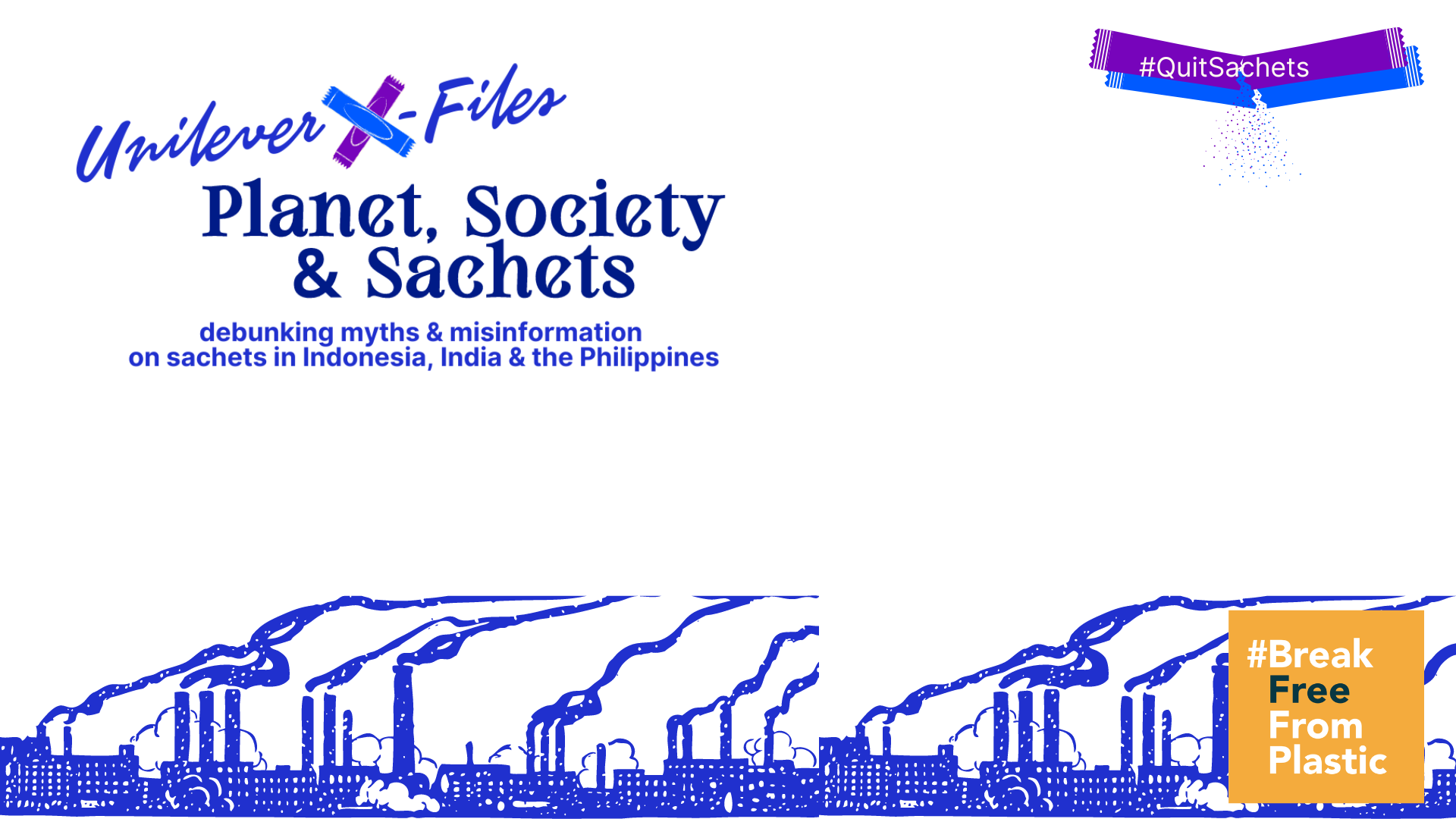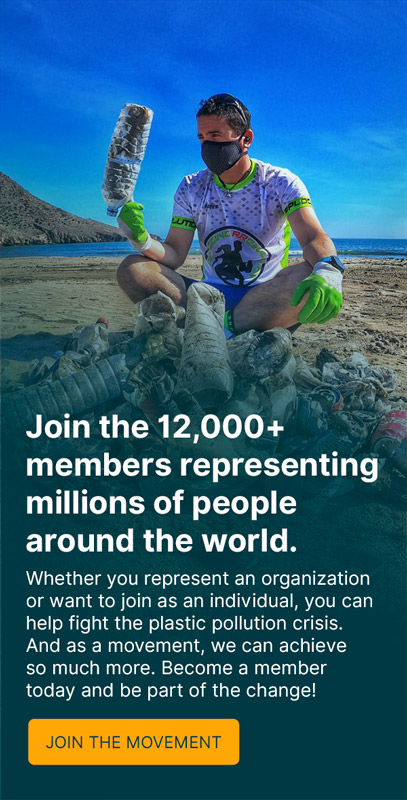Asia-Pacific (26 July 2023) — In solidarity with communities across the Asia-Pacific region, 117 organisations from 44 countries and territories around the world have signed an open letter urging Unilever’s new CEO, Hein Schumacher to take immediate action against the company’s plastic pollution footprint, in particular to phase out plastic sachets.
Corporations like Unilever, have fuelled the sachet expansion in countries across Asia-Pacific. These single-use sachets, made from plastic and other non-recyclable materials, overwhelm waste management systems, cause irreversible harm to the environment and wildlife, and exploit waste pickers and disadvantaged communities. Recent reports, including one from Reuters, have highlighted the devastating consequences of Unilever and other corporations' sachet-driven business models. Ironically, low-income communities targeted as the primary consumers of sachets, often bear the true cost of this unsustainable packaging.
Several countries in Asia have implemented or announced regulations and bans on single-use plastics (SUPs), including the Philippines, India, Indonesia, Bangladesh, South Korea, Thailand, Vietnam, Malaysia, the Maldives, and Mauritius. Yet it is concerning that sachets have fallen outside the purview of single-use plastic bans.
As consumers shift towards more sustainable brands, many global corporations have adopted voluntary sustainability goals. For instance, Unilever committed to making all plastic packaging — including sachets — reusable, recyclable, or compostable by 2025. However, the inclusion of sachets, with its inherent waste issues, can potentially undermine Unilever's sustainability targets.
In the last few years, Unilever executives and former CEO have openly acknowledged the inherent issues with sachet waste. On 24th July 2020, former CEO Alan Jope stated, "We have to get rid of them [sachets]. It's pretty much impossible to mechanically recycle and so it's got no real value.” Hanneke Faber, then Unilever’s President for Global Food & Refreshments, said “[sachets are] evil because you cannot recycle them.”
Paul Polman, former CEO of Unilever, recently admitted, "[...] despite our best efforts, and lord knows we tried, packaging this small and with such little value has proved impossible to collect at scale, let alone recycle. We need to get rid of harmful sachets for good."
Despite Unilever’s commitments and statements, the company produces 713 metric tonnes of plastic per year, as reported in the New Plastics Economy Global Commitment (2022), with sachets representing 19% of its products. Worse still, Unilever continues to promote false narratives about how sachets benefit low-income communities. It invests in inadequate solutions like chemical recycling, co-incineration, zero-emission plans, token livelihood programmes, and downcycling projects, none of which address the intrinsic problem of sachet production and distribution. Unilever has also contributed to undermining progressive public policies aimed at tackling sachet waste.
If sachets continue to be an integral part of Unilever's business model, the company risks failing to meet its commitments, contradicting its own claims of being a sustainable corporation.
To strengthen this argument, the Break Free From Plastic movement released fact sheets titled ‘Unilever X-Files: Planet, Society & Sachets’, to debunk the myths and misinformation on sachets. The fact sheets highlight how Unilever has fallen far short of the mark between philosophy and practice with regard to plastic sachets, particularly in Indonesia, India, and the Philippines. They make a case for businesses like Unilever to achieve its sustainable business goals by quitting sachets while setting benchmarks for other corporations to follow.
Given the company’s inaction to date, 117 organisations from 44 countries and territories around the world have signed an open letter urging Unilever’s new CEO, Hein Schumacher, to take immediate action against the company’s plastic pollution footprint, especially with regard to plastic sachets. The letter was emailed to key staff at Unilever on July 25 and will be hand-delivered to some Unilever headquarters in Asia-Pacific this week.
Break Free From Plastic (BFFP) and its member organisations call upon Unilever to lead by example and become the first mover in the industry to #QuitSachets. It is crucial that Unilever recognizes the demand for change and takes responsibility for its role in perpetuating the sachet crisis in Asia-Pacific. It is time for Unilever to demonstrate its commitment to sustainability, environmental responsibility, and the well-being of communities worldwide.
Quotes from BFFP member organisations:
MARIAN LEDESMA, Zero Waste Campaigner, Greenpeace Southeast Asia -Philippines, said:
"Unilever’s dependence on sachets and false solutions is perpetuating the plastic crisis. The company's practices leave communities to bear the costs of the company’s plastic production and use. Unilever must take real action to address plastic pollution and protect people by phasing out sachets and transitioning to reuse and refill models for communities."
YOBEL PUTRA, Climate and Clean Energy Campaign Officer · GAIA (Global Alliance for Incinerator Alternatives) - Indonesia, said:
“Cement kilns and failed recycling initiatives like CreaSolv will not truly address plastic sachet waste, thus only allowing consumer brands to continue business as usual. It would be like moving the landfill from the ground to the sky. Moreover, burning plastic waste in cement kilns merely substitutes one form of fossil fuel with another, while CreaSolv is just another distraction designed to ignore the plastic problem.”
AILEEN LUCERO, National Coordinator of Ecowaste Coalition - Philippines, said:
"Unilever initiatives on the plastic crisis are just delaying tactics while promoting their business as usual scheme. Unilever's lobbying through EPR only legitimizes their false solutions activities like cement kilns. Burning and melting plastic do not only harm the planet but public health as well. Without a concrete timeline to reduce their production and shift to a sustainable and alternative packaging and delivery system, especially of sachets, this will only worsen the burden of the plastic crisis.”
Swathi Seshadri, Director (Programs) and Team Lead (Oil and Gas) at the Centre for Financial Accountability - India, said:
“In 2001, Hindustan Unilever (HUL) presented Project Shakti purportedly as an initiative that empowers women in Indian villages, to foster an entrepreneurial spirit and grant them financial independence. A close reading of this initiative suggests that it is really a low-cost marketing strategy for HUL, revolving around brand building, promotion, and profit generation in the garb of women's self-determination. This has resulted in problematic cultural assimilation, where traditional materials and practices are substituted with HUL's branded products on the one hand and the proliferation of sachets, and plastic pollution in rural areas on the other, while thwarting traditional systems of reuse to retail their products.“
MIKO ALIÑO, Project Coordinator for Corporate Accountability - Sachets, Break Free From Plastic (BFFP) - Philippines, said:
“As a member of the Business Coalition for a Global Plastics Treaty, Unilever rightly advocates for a legally-binding treaty aimed at reducing plastic production, capping the use of virgin materials, and eliminating plastic leakage. However, it’s mind-boggling to see that it’s doing quite the opposite in the Asia Pacific region, from the continued production of problematic, non-recyclable sachets to relying on burning activities under the guise of plastic offsetting.”
—-------------------------------------------------------------------------------------
Need photos to feature with your article? Access our photo bank here. Photo Credit: Prigi Arisandi / ECOTON-Indonesia.
Notes to the editor:
Sachet Economy: Big Problems in Small Packets: This report from the Philippines explains the problems with sachets.
Missing the Mark: Unveiling Corporate False Solutions to the Plastic Pollution Crisis: This report outlines the scale of investment in false solutions that big companies have been making.
Chemical Recycling of Sachet Waste: A Failed Experiment: This report by GAIA (Global Alliance for Incinerator Alternatives), focuses on Unilever's failed attempt to recycle sachet waste in Indonesia using CreaSolv technology.
Reuters Trash & Burn: This article dives into landfill mining and the climate impact of burning plastic waste in cement kilns.
—-------------------------------------------------------------------------------------
For media inquiries, please contact:
-
Devayani Khare (Break Free From Plastic - Asia Pacific Communications Officer) | devayani@breakfreefromplastic.org
-
Eah Antonio (Break Free From Plastic - Senior Asia Pacific Communications Officer) | eah@breakfreefromplastic.org
#breakfreefromplastic is a global movement envisioning a future free from plastic pollution. Since its launch in 2016, more than 2,500 organisations representing millions of supporters around the world have joined the movement to demand massive reductions in single-use plastics and push for lasting solutions to the plastic pollution crisis. BFFP member organisations and individuals share the shared values of environmental protection and social justice and work together through a holistic approach to bring about systemic change. This means tackling plastic pollution across the whole plastics value chain—from extraction to disposal—focusing on prevention rather than cure and providing effective solutions. www.breakfreefromplastic.org



